Fighting Games: The Depth Behind Their Fundamentals and Community
Down-forward Punch. Some read it as 2-3-6, referring to the keys on a number pad. Regardless of of someone’s experience with games in general, they’ve probably heard of the Hadouken and its input from the Street Fighter series. If they grew up playing the older games of the franchise, they might have been told about the move by an older sibling or a friend “whose uncle works for Capcom.” Despite their popularity in the mythical days of arcades and hidden button inputs, fighting games fell on hard times in the Western industry when realistic shooters and open world role-playing games hit the forefront of gaming. Nowadays, fighting games fit comfortably enough in their own niche, weaving in and out of mainstream culture with releases like Killer Instinct, Mortal Kombat X, Super Smash Brothers, and the not-yet-released Street Fighter V.
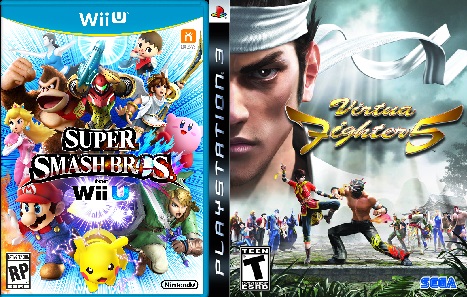
Despite their second coming, fighting games have often been put to the side by some gamers in exchange for easier-to-enter genres like first-person shooters and role-playing games. Ironically enough, others look down on fighting games as plain button-mashers that are all flash and no substance, preferring other categories like real-time-strategy games and simulators. Sadly, like many older video game genres including platformers, fighting games suffer an issue of being misunderstood by the general gaming public despite efforts to make them more appealing; additions like character creation in Mortal Kombat series or guest characters like Darth Vader and Ezio Auditore De Firenze in Soulcaliber are fun for a few games at their best, and gimmicky at their worst. Although some games have been designed with beginners in mind like Super Smash Bros. and others have high barriers of entry and learning curves like Third Strike or Virtua Fighter, fighting games all share a general unifying depth in their gameplay. Concepts like yomi, zoning and combos are rewarding in their complexity and all come back to a central idea of understanding the world.
The Character Select Screen, Yomi and Mindgames: Understanding Yourself and Others
Unlike role-playing games where the gamer plays alone, or shooters and online games where one plays with a large group, fighting games focus on the two players facing each other. Nothing else matters and no one else can interfere – it’s player one versus player two. Like chess, fighting games are about making the right move at the right time. Should they block? Should they grab? Should they throw out their super combo and hope that they hit? The player must understand what their character can do – are they good at grappling? Striking? Projectiles? For beginners, this can be baffling – a grappling character like Zangief from Street Fighter has a different move set and play style compared to a simpler striking character like Ryu. However, this is reflective of understanding oneself – one’s limitations and strengths. The player must also understand what they can do behind the controller – do they have fast reflexes? Are they good at thinking ahead? When a character is picked, it’s based off of many, many factors and some of the most important ones lead back to playing to one’s strengths and covering one’s weaknesses.
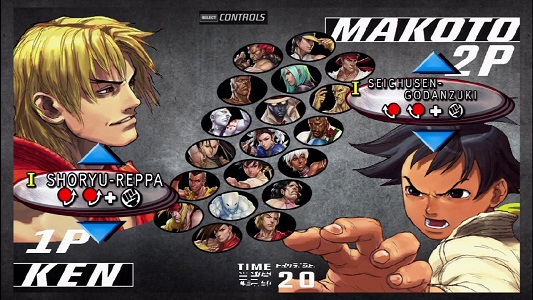
In the fighting game community, the term “yomi” is used, meaning “to read” in Japanese. In this context, it represents reading the mind of the opponent. Many consider this to be what separates the good players from the bad – being able to understand how the opponent thinks and what they’ll do allows the player to prevent them from winning. Manipulation and mental conditioning for opponents is called “mind-games” in the fighting game community and are a part of yomi. In order to win, players can manipulate the reflexes and reactions of their opponents by conditioning them to react in a desired fashion. Maybe it’s a hard punch instead of a light one or an uppercut instead of a fireball. These seemingly-small differences can actually result in breaking an opponent’s confidence and by playing with this, players start to delve into the mental game. Manipulation of others as well as preventing the manipulations of oneself are vital if one wants to be successful at fighting games, compared to other games that rely solely on “twitch reflexes.” Sun Tzu said in the Art of War, “if you know the enemy and know yourself, you need not fear the result of a hundred battles.”
Zoning, Space Management and Pressure: Learning to play the game of limits
In most fighting games, characters move in a single lane from a two-dimensional perspective. However, in series like Tekken or Virtua Fighter, characters fight in a 3-d dimensional plane and can move forward, back, up, down and in and out. Regardless of the dimension however, the concept of spacing and “zoning” comes into play. Spacing refers to the placement of the character on the screen – are they in the middle? The left and right sides? Understanding this is extremely important as they allow for players to accurately predict if they are in range of the enemy’s attacks or if they can physically hit their opponent. As different characters are designed with varying size and weight, the player must understand the limits of their character and play within those boundaries. Things like movement speed and jump height are also important as they limit the movement and ability to maintain spacing as well. This goes back to the idea of players needing to have a solid grasp of their character’s, and by extension, their own limits to win.
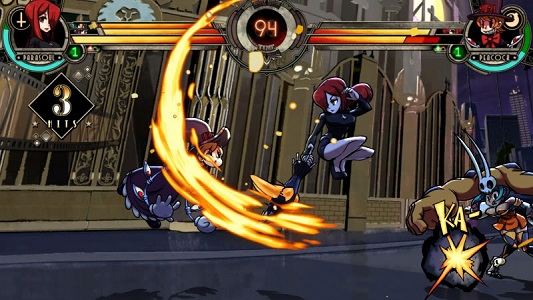
Another concept that comes with spacing is zoning and pressure. An initially hard concept for most beginners, zoning involves maintaining a certain level of pressure to maintain a dominant position on the opponent. This can be done with certain attacks and mind games to keep an opponent as limited as possible. As their options decrease, it becomes easier and easier to defeat them. Pressure in fighting games can show up in the game as well as in life – constant, in-your-face attacks and tactics on the virtual battlefield can force opponents to go on the defensive while the mental strain on a player behind the controller from being pushed so aggressively can result in errors in judgement and reaction. The knowledge of one’s limits as well as the understanding and ability to manipulate one’s environment are vital if one wants to be successful at fighting games. The clever combatant imposes his will on the enemy but does not allow the enemy’s will to be imposed on him.
Combos, Hit Confirms, Cross-ups and Mix-ups: The Art of Knowing When and How to Hit
Although fighting games differ in art style, perspective and design, almost all of them involve combos in some way, shape or form. Asides from their obvious usage of doing more damage to an opponent, combos play a role in putting opponents under pressure. Some characters in fighting games are labelled as “rushdown” fighters, specialized for their ability for long and damaging combos and their ability to keep opponents on the defensive. Although combos can be effective and visually stunning, they demand not only dexterity from the player but a mental understanding of offense and defense; the strongest and most impressive combos are useless if they don’t manage to find their target. Hit-confirms are the solution to this: unique attacks that are usually at the beginning of combos, stun opponents and let players extend into a full combo or special attack. Learning the move sets and hit confirms of different characters gives players more offensive and defensive options and comes back to the idea of understanding oneself and others.
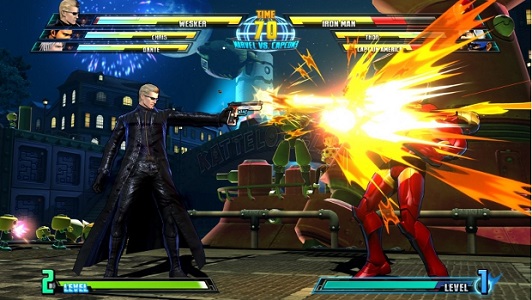
As many beginners to fighting games find out, it’s not enough to be able to do strong combos if they’re blocked in the first place. Going back to the idea of yomi and mind games, the usage of cross-ups, or hitting someone from behind to get around a guard, and mix-ups, or hitting someone from high, low or overhead, comes into play. Through yomi and an understanding of the opponent, attackers can figure out which angle to attack from while defenders can predict the best ways to block. These tactics can be used to get around an opponent’s defense and break them mentally – it’s usually when players think that they’re safe that they end up losing games. This loss results in their frustration, making them easier to beat and control. Other game genres like shooters don’t have the same mental depth and games that fighting games bring to the table; the better player is the one that can outplay the other – both physically and intellectually.
The Fighting Game Community: Friends and Family From Combat
In the end, the most distinguishing feature about fighting games compared to other genres is its extremely strong and diverse community and culture. Despite its niche status, fighting games are responsible for the growing e-sport scene all over the world with huge annual tournaments like EVO. Many players stream their games, offering support and entertainment, while many others like Maximillan Dood, Mike Ross and Gootecks devote themselves to making the FGC (Fighting Game Community) as accessible and informative to beginners through YouTube. The competitive nature of the genre creates rivalries and tales that go from the East to the West, bringing players together under one roof despite differences in race, culture and language; players speak a common language with their fists and their hearts, translated through arcade sticks and game controllers. Although the entry barrier is high, the fighting game community shows support for its beginners like none other and makes the journey of learning a fulfilling one through and through.
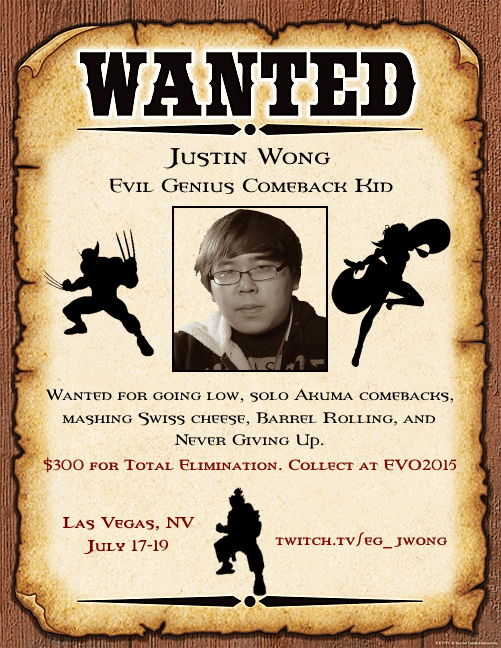
Despite mainstream misconceptions about fighting games and its community, the genre is alive and well. Fighting games present a strong mental game along with a high standard for physical execution, nerves and confidence. The games and the players themselves are complex puzzles to be solved, enjoyment coming from the thrill of success and the bonds of community. Fighting games let players feel smart, feel like they’ve outwitted opponents with their superior understanding of the game and the mind while the ones that fall always have the chance of redemption through training and practice. The call of “Ready? Fight!” brings people together through cheers and shouts, and at the forefront are the best players, driving the hype train to fight for the future.
What do you think? Leave a comment.











Fighting games have become probably my favorite genre of video games. Injustice, Marvel vs. Capcom, Super Smash Bros, Mortal Kombat, I love most fighting games. There is something fun and bad ass about fighting only one opponent, in a battle to the death. Your article defiantly highlight some of the best aspects of fighting games, and why they are so endearing
The best thing about fighting game is it’s has a never ending learning curve physically and mentally. Even top players learn things everytime because of the depth and complexity of fighting games.
what about some indie fighting games? Touhou’s Scarlet Weather Rhapsody and the newest fighting installment (forgot the name) has a simple mechanic to do moves, though the better moves could only performed when you damaged your opponent enough to summon the “spell card” which upon activation will make your character all the cool stuff like blasting with lazors, summoning Yin and Yang Orb, dashing all over the camera, creating tornaodes and such… though this would means your opponent also know what kind of special move you might use next since you’ll have to chose the card first before executing them and the card is visible on the bottom of the screen
The Touhou fighters are great fun, but play very differently from your “standard” fighters – they focus heavily on zoning because of the shmup nature of the source material.
Nice post. I think the biggest reason you won’t see fighting games become huge is due to the raw technical skill required to play most fighting games. Sure, explaining mechanics can help explain what you’re doing wrong, but at some point you just have to be able to do the move.
They’re definitely a bit of a physical boundary, I can’t deny that, but I think that understanding how the game works makes it easier to learn the physical commands.
If you’re new to fighting games, play Skullgirls. It has one of the best tutorials for teaching basic fundamentals as high level tactics.
I can’t agree more! I’m a big fan of Skullgirls myself!
Don’t forget the top tier waifus.
The main dilemma with the fighting game is its complexity. With new and complex systems added to each game, the beginners find it difficult to enter the genre. Not only you need to know the command for each attack, you also need to understand concepts like priority, frames, etc. etc. Otherwise it becomes just a button mash, and you will be destroyed by expert players.
The tutorials help, but they can be time consuming and frustrating for the casual gamers. Which makes it vital for the developers to create fun and engaging tutorials.
I really want to play Killer Instinct now.
Killer Instinct is one of the best along with Skullgirls for getting into the FGC.
This was like spirit science of fighting games.
I personally kind of like the challenge of fighting games, because you really have to put in time to get somewhere with them. But equally, I think times are changing and if we can help new players pick up fighting game mechanics more easily, that can only be a good thing for the community. It means more people to play with, more money for the devs (meaning more incentive to make fighting games) and bigger tournaments. There are a lot of elitist in the fgc who snort at anyone new, but I started playing these games to find new people to play against and to show love for these beautifully designed games. To me, that’s what it’s about.
I think most people quit fighting games after two or three weeks because they dive online thinking they will win. They then lose alot and it just gets frustrating. If people would spend time in practice and learn a charecter it would be alot more enjoyable.
Fighting games are never going to be as popular as they could. But fighting games aren’t a niche genre because they’re too difficult. They’re pretty average in terms of picking up the basics. The problem is that in order to get your money’s worth out of the game and get better in general, you’re going to have to play other people online, and you’re going to lose.
A LOT.
That’s something that demoralizes a lot of people and in my opinion that’s a good thing. I don’t want to play a fighting game with someone who doesn’t have the drive to get better or can’t take a loss with respect.
One of the reasons why the community is so strong despite being small is that the members are you best friends when it comes to learning. There’s no shortage of beginner and advanced tutorials of almost every character in every fighting game. If you want to learn, go learn. Enjoy your wins, learn from your losses, and have fun with it.
Hadouken Hadouken Hadouken Hadouken Hadouken Hadouken Hadouken Hadouken Hadouken Hadouken Hadouken…!
I had forgotten when fighting games were intimidating… I mean I’ve been playing them for so long…. Now fighters feel so natural, even one I’ve never played before usually is familiar-feeling. I forgot the barriers some face when playing a fighter.
That makes sense. Once we get that muscle memory, it becomes second nature.
Sort of related note: I just found out there is a Street Fighter deck building game by Cryptozoic, the same people who made the DC and Hobbit deck building games. Now my dream fight between Ryu, Batman and Bilbo Baggins will finally happen!
Video games are just the best.
One of the big things that puts me off of fighting games is the over-reliance on what I’ve seen referred to as “techy” strategy. That is, once everyone gets well-versed in all the various combos and optimal strategies, the game boils down to a matter of knowing which frame to punch on, what specific button to press while crouched when the opponent is X pixels off the ground, and so forth. I understand that for a lot of people, this is where the game starts becoming interesting, but it’s absurd that you have to be at that level of play to get there. There’s this massive gulf between beginner fighting game players and these almost terrifyingly well-versed professionals that is very, very hard to bridge.
I agree with that for sure, but there are plenty of low level tournaments that aren’t aimed towards the technical pros. Although some of the most interesting things is watching technically masterful players go at it..
I can relate to this. I really, REALLY got into Killer Instinct recently, particularly because of the core combo mechanics. In contrast to a lot of fighting games that emphasize the technical aspects, the mind games and opponent prediction are at the forefront.
Few things are more satisfying than pulling off a Counter Breaker; it feels especially rewarding because it’s very simple to attempt but requires good planning to pull off. But after getting fairly deep into that game (I think I’m 11 on the 1-40 ranking scale right now?), it still devolved into the same sort of impossible level of strategy.
I’ve had to stop playing – especially online – because I just hit a wall where I don’t want to read lists of frame statistics to get marginally better. I understand that any video game is going to come down to that sort of nitpicky nuance at a competitive level, but I think it’s a huge problem for gaming’s accessibility that the entire fighting genre tends to demand an unreasonable skill requirement to even be a contender.
I don’t really mind the idea of games with prohibitively high skill floors, even if I have no desire to play them myself. What sort of hurts me though is seeing games that were obviously designed with dopey fun in mind getting warped into joyless, competitive endurance tests. It’s sort of exciting in theory, I guess, that SSBM’s combat mechanics are rich enough to support a scene this intensive, but seeing play at this level almost feels instinctively wrong to me. Carving out huge amounts of that game’s content and turning it into a 1v.1 gauntlet of pure skill seems like a corruption of a game that feels like it just wanted to be about Pikachu beating up Luigi. Mind you, I say that as someone who mained Mr. Game and Watch for his sheer unpredictability, and as someone whose all time favourite fighting game is the competition-defying Power Stone 2.
Nicely done! that was really interesting to read. It is certainly something that I have never thought about but definitely a category of games I grew up with.
I never bought or played any Tekken game beyond the 32-Bit genre because of the high learning curve needed to achieve mastery of this awesome game franchise.
My advice for beginners – be a scrub. Pick the cheapest character.
The main problem I have with fighting games (especially one I got recently being Ultimate Marvel vs Capcom 3) is knowing how to do moves, being able to do them in training, but not able to pull off in the speed of a match.
For example, as a new player, try to do a move in UMvC3 that involves the input forward, down, forward + down (diagonal), + H. Now do it 5 times in a row. The main reason I say this is because I like to use Zero and I would love to use the lightning move or the fire sword thing, but it’s just so hard to do. The weird part is, I can do the inputs perfectly fine when using hyper combos.
For example, I use the Ace Attorney move all the time and it works every time, but if I try to use… say… solar flare on Amatarasu, it only works about half the time.
Fighting games are great and an be really big if they can hold a gamers attention with their story line.
The biggest issue for me with fighting games are that I no longer feel fighters are worth the price tag. Games are way too expensive these days, and paying $80 for a game I’m going to play for a few hours is too much. Then add in how awful they tend to be (or at least have the perception of due to their prior history) and they become games you often need friends in person. The gaming world has changed. Unless you’re part of the active fighting community, most gamers aren’t going to their buddies place and having awesome parties like we did years ago. I think most people will always love fighters, but overall it would take something special for them to have a real boom period again.
I’m always amazed by professional gamers. For me fighting games were always just button mashing, so it’s really cool to see people who are actually well-versed play.
Interesting article! Well done!
I love to play fighting games, but the base level of knowledge to have any idea what’s going on at a level higher than “That one guy jumped over there and kicked that one other guy.” is pretty high.
People who play fighting games VASTLY underestimate just how complicated and confusing they are to casuals (myself included).
Most games, for that matter.
While we’re on the topic of fighting games: you know what this is missing? DINO REX.
What’s Dino Rex, you ask? It is the most beautifully stupid fighting game on earth.
This is great. Thanks for the read.
After I got pretty good at SF IV against the machine, I tried playing it against online opponents.
Man, do I ever suck.
My skills peaked with Street Fighter 2. I pick Ryu. If my opponent is standing: Fireball. If they’re jumping: Dragon Punch. That’s all I got. Any combos that happen are accidental.
fighting games seem scarier every year.
Its a good article for someone that knows a bit about the fighting game scene but it feels as though it doesn’t get the whole picture to someone who is just reading about this for the first time.
As someone that’s loved fighting games for quite a while, it saddens me how many people are turned off by the execution barrier that exists for each one.
Fighting games are the best – especially when arcades were still around